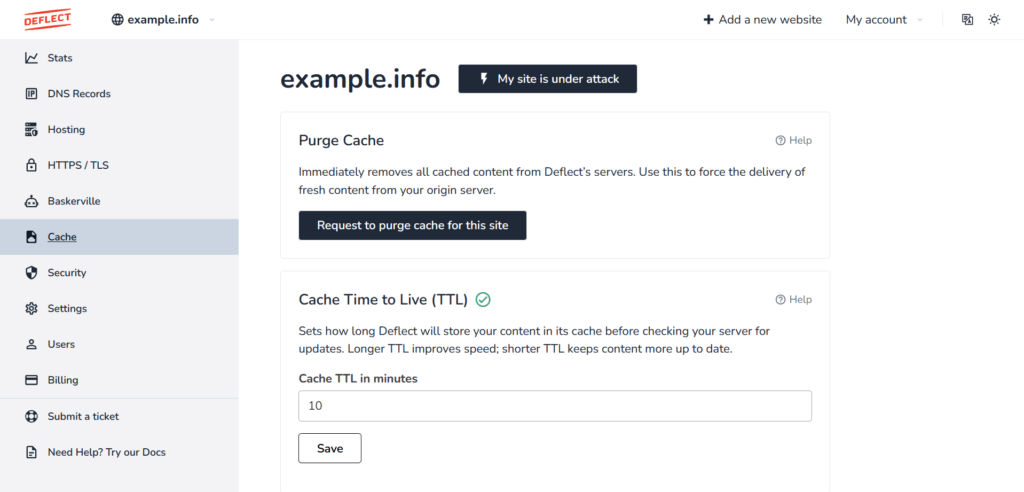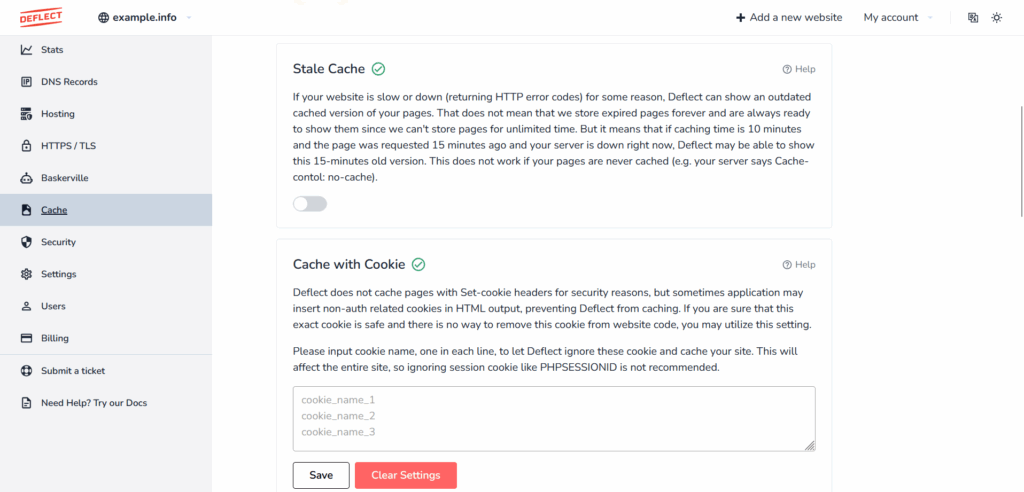In the cache tab, you have access to configure the cache management settings on Deflect, which can enhance the speed and protection of your website.

Caching on a reverse-proxy server like Deflect involves storing copies of website content in order to quickly serve this information to users. When a user makes a request for a webpage, instead of the request going directly to the original server where the website is hosted, it goes to Deflect. If Deflect has a recent copy of the requested content in its cache, it can deliver this to the user immediately, reducing the response time. If not, it queries the original server for the content, and then stores a copy for potential future requests.
This process helps decrease the load on the original server and improves the end-user’s loading time. In addition, it also enhances the security by providing protection against DDoS attacks as Deflect absorbs these attacks rather than the original server.
Purge Cache #
Instantly eliminates all stored data from Deflect’s servers. Utilize this to compel the delivery of new content from your source server. This is beneficial if you have recently updated content on your website, or for development related needs.
Cache Time to Live (TTL) #
Sets how long Deflect will store your content in its cache before checking your server for updates. Longer TTL improves speed while shorter TTL keeps content more up to date. By default, cache time is set to 10 minutes.
Stale Cache #
Deflect has the capacity to display an older cached version of your pages if your website is slow, down, or returning HTTP error codes for some reason. However, this doesn’t imply that we permanently save outdated pages or are always prepared to show them, as we’re unable to maintain pages indefinitely.
For instance, if the cache time is 10 minutes, and a request for a page was made 15 minutes ago, but your server is currently down, Deflect might be able to display this 15-minute old version of the page. This feature does not apply if your pages aren’t ever cached.
Cache with Cookie #
Deflect does not cache pages with Set-cookie headers for security reasons, but sometimes application may insert non-auth related cookies in HTML responses, preventing Deflect from caching. If you are sure that this exact cookie is safe and there is no way to remove this cookie from website code, you may utilize this setting.
Please input cookie name, one in each line, to let Deflect ignore these cookie and cache your site. This will affect the entire site, so ignoring session cookie like PHPSESSIONID is NOT recommended.

Cache Lock #
By activating this feature, Deflect can mitigate the Thundering herd problem, where numerous requests to an uncached page are proxied to the origin server, causing slow response and overload.
This ensures the page is requested only once, with subsequent requests delayed until the initial response is received. Enabling this feature may significantly decreases the load on the origin server.
Add Cache-Control Header on Deflect #
If your origin server doesn’t send cache headers, Deflect will automatically add a Cache-Control header with the cache TTL configured above to help optimize caching behavior and performance.
Once activated, Deflect will only send Cache-Control header, if Cache-Control is missing from your origin server.
Ignore Expires Header #
By activating this feature, Deflect will disregard your server’s Expires header and allow Deflect to apply optimized caching rules for better speed and efficiency.
Ignore Cache-Control Header #
By activating this feature, Deflect will disregard your server’s Cache-Control header and allow Deflect to apply optimized caching rules for better speed and efficiency.
Override “Vary” Header #
The Vary header determines which version of a page to serve based on request headers. If it’s too broad (e.g. Vary: User-Agent, Cookie), it can prevent effective caching by creating too many cache variations.
By enabling this feature, Deflect will remove the existing Vary header, and set an optimal Vary: Accept-Encoding header to ensure your website is properly cached.
Disable Cache for 403 Forbidden Page #
Ensures that 403 forbidden pages are never cached. Each request will go to your server to verify access status in real time.
Disable Cache for the Entire Website #
When this feature is enabled, Deflect will no longer cache your website’s content. All user requests will be sent directly to your origin server. This may be useful during development or troubleshooting but can result in slower load times and increased server load.
